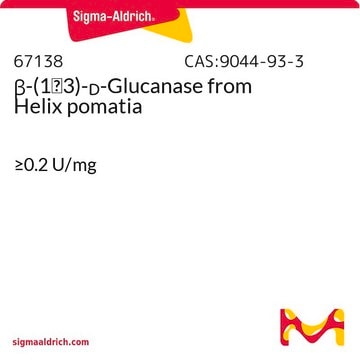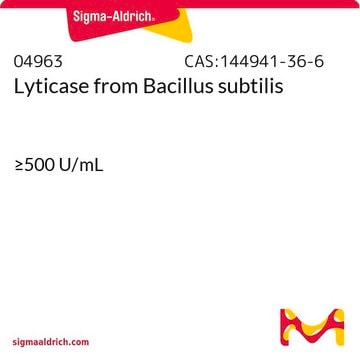L3768
Lysing Enzymes from Aspergillus sp.
powder
Sinónimos:
Cellulase, Lysing Enzymes, Pectinase
Iniciar sesiónpara Ver la Fijación de precios por contrato y de la organización
About This Item
UNSPSC Code:
12352204
NACRES:
NA.54
Productos recomendados
biological source
Aspergillus niger
form
powder
technique(s)
cell based assay: suitable
color
brown
suitability
suitable for cell lysis
application(s)
cell analysis
storage temp.
2-8°C
General description
Lysing enzymes are also known as lytic enzymes or cell wall lytic enzymes.
Application
Lysing Enzymes from Aspergillus sp. has been used to digest the cell walls to create pulse-field gel plugs.
Lysing Enzymes from Aspergillus sp. has been used:
- to digest the cell wall of Schizosaccharomyces pombe
- to lyse the mycelium cell wall of Trichoderma harzianum
Biochem/physiol Actions
Lysing enzymes are a group of enzymes that can break down the cell walls of microorganisms. These enzymes play a crucial role in various biological processes, including cell lysis, tissue dissociation, and protein extraction. Lysing enzymes are commonly used in research, biotechnology, and clinical applications. They are especially useful in DNA extraction, where they help to release genetic material from cells by breaking down the cell walls. This enables efficient isolation and purification of DNA for downstream analyses. Cellulases are a class of enzymes that degrade cellulose, a major component of plant cell walls, into simpler sugars. These sugars can be utilized as raw materials to produce biofuels, biobased chemicals, plastics, and various other materials. Pectinases are a group of enzymes that hydrolyze pectic substances found in microorganisms and higher plants. They can break down the pectin-containing compounds synthesized by plants and microbes.
Quality
Contains pectinase and cellulase activities.
Storage Class
11 - Combustible Solids
wgk_germany
WGK 3
flash_point_f
Not applicable
flash_point_c
Not applicable
Certificados de análisis (COA)
Busque Certificados de análisis (COA) introduciendo el número de lote del producto. Los números de lote se encuentran en la etiqueta del producto después de las palabras «Lot» o «Batch»
¿Ya tiene este producto?
Encuentre la documentación para los productos que ha comprado recientemente en la Biblioteca de documentos.
Los clientes también vieron
Translesion synthesis polymerases contribute to meiotic chromosome segregation and cohesin dynamics in Schizosaccharomycespombe
Mastro TL, et al.
Journal of Cell Science (2020)
Pectinase from Microorganisms and Its Industrial Applications
Haile S and Ayele A
TheScientificWorldJournal (2022)
Unleashing the Promise of Biotechnology to Help Heal, Fuel, and Feed the World
Greenwood JC
Journal of biological and chemical chronicles (2014)
Tara L Mastro et al.
Journal of cell science, 133(10) (2020-04-23)
Translesion synthesis polymerases (TLSPs) are non-essential error-prone enzymes that ensure cell survival by facilitating DNA replication in the presence of DNA damage. In addition to their role in bypassing lesions, TLSPs have been implicated in meiotic double-strand break repair in
New strains obtained after UV treatment and protoplast fusion of native Trichoderma harzianum: their biocontrol activity on Pyrenochaeta lycopersici
Besoain X A, et al.
Electronic journal of Biotechnology, 10(4), 604-617 (2007)
Nuestro equipo de científicos tiene experiencia en todas las áreas de investigación: Ciencias de la vida, Ciencia de los materiales, Síntesis química, Cromatografía, Analítica y muchas otras.
Póngase en contacto con el Servicio técnico









